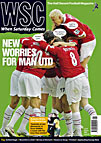 Harry Kewell's hair might be pony, but after 32 years Australia are back at the World Cup and, as Mike Ticher reports, it's not just soccer diehards who are celebrating.
Harry Kewell's hair might be pony, but after 32 years Australia are back at the World Cup and, as Mike Ticher reports, it's not just soccer diehards who are celebrating.
Some things are hard to forgive. For example: planning a ticker-tape parade to celebrate winning one World Cup qualifier, on penalties; inviting John Travolta on to the pitch and into the dressing rooms; 80,000 people booing the visitors’ anthem; banners and chants proclaiming “U R gay”; Harry Kewell’s double ponytail; playing Men at Work at full volume after the final whistle.
But despite all that, it was impossible not to share in Australia’s excitement at finally qualifying for the World Cup again after a wait of 32 years. The shootout win over Uruguay at a feverish Telstra (né Olympic) Stadium in Sydney was like a dam breaking. Over it flowed euphoria, relief, gratitude, bitterness, melancholy and wild expectations, one after the other.
There were good excuses for some of the behaviour – though not Kewell’s hair. Diehard soccer fans have been through years of agony and, for all their international sporting belligerence, other Australians are under few illusions about the global status of their most popular pastimes. They know what the World Cup means. Qualification was greeted with a raucous frenzy in the media, on the streets (a respectably disruptive celebration, if not quite up to South American standards) and in dressing rooms from Middlesbrough to Basle, Parma and even Sydney (not least because “Dwight Yorke’s Trinidad & Tobago” also made it).
The explosion of delight reflected Australia’s yearning to get on stage in a sporting drama that everyone else cares about – bear in mind that the next best thing in 2006 is the Commonwealth Games in Melbourne. The following day several papers carried a variant of Look Out, World! headlines, when perhaps what they really meant was Look At Us, World! Fans of other sports rushed to proclaim the atmosphere in Sydney as unlike anything they had experienced before. Or, as Mark Schwarzer put it to the Sydney Morning Herald: “People have told me that they can’t remember feeling like this since Australia won the America’s Cup.”
But if there was a good deal of unrequited sporting nationalism around, it was also a night when everything fell into place for soccer’s diehard fans. They invoked the saintly presence of Johnny Warren, who played in the 1974 finals and who, by the time of his death last year at 61, had become father figure, evangelist and tireless promoter of the game as a symbol of multiculturalism and a bridge to Asia.
The crowd’s overt aggression may not have been quite in the Warren ideal, but it was what the team needed (“a massive, massive boost” said Mark Viduka of the anthem-booing) and, frankly, what the Uruguayans deserved. They had messed about with the first-leg kick-off time, apparently in an attempt to delay Australia’s journey home, and persuaded FIFA to replace the officials for the return, on the laughable grounds that a Belgian referee would favour a team with a Dutch coach.
Inter’s dim-witted Alvaro Recoba injected a bit more poison by insisting Uruguay had a “divine right” to qualify. And in Sydney they played as though they believed it, putting on a classic display of time-wasting, play-acting and general arsing about, when one away goal would certainly have sent them through. The petulant touchline antics of the gesticulating, Marty Feldman-esque Jorge Fossati barely helped.
Australia, by contrast, at last discovered, in Guus Hiddink, a coach with the detachment and nous they needed. His bold tactical shuffling mostly came off, the team played quick, intelligent football and he coaxed blinding performances from several players who seemed lost causes through age, form or injury. He made Australia believe they could win – even with the creaking limbs of Tony Vidmar and Tony Popovic in defence – and added the previously elusive quality of luck. Hiddink, for reasons best known to himself, wanted to put the 6ft 7in reserve keeper Zeljko Kalac on for the shootout, but Brett Emerton went down with a timely bout of cramp and had to be replaced by the third sub. In the event Schwarzer saved two penalties and, perhaps, Hiddink’s bacon.
Qualifying will not instantly transform soccer’s fortunes in Australia, but it has lanced a festering boil. However the team performs (and they may only be a central defender or two away from surprise-package status) soccer will occupy an unprecedented space in the public consciousness for the next seven months.
No doubt the fans will also add their own special dash of kitsch, self-deprecation and boorishness to the mix, swelled by vast numbers from Britain preparing to turn the tournament into a stop-off on the way to the Pamplona bull-running or the Oktoberfest. If that’s a prospect that’s suddenly turned you off the World Cup, well – you better run, you better take cover.X
From WSC 227 January 2006. What was happening this month
Why would anyone be surprised by a unfriendly reception to Uruguay? It was after all the apparently 'umble Luis Garisto who ended Ray Baartz's playing career with a karate chop to the throat in a pre-1974 WCF friendly.